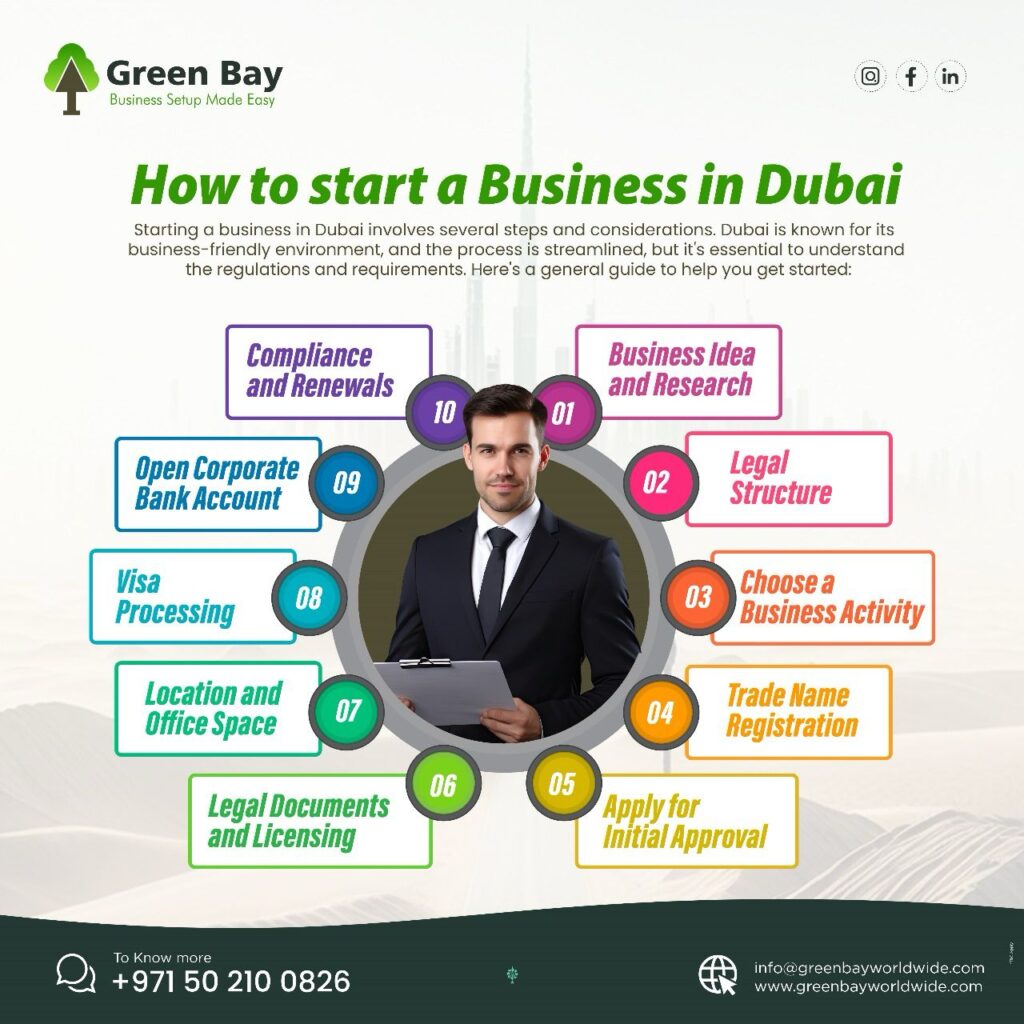
Close
Starting a business in Dubai involves several steps and considerations. Dubai is known for its business-friendly environment, and the process is streamlined, but it’s essential to understand the regulations and requirements. Here’s a general guide to help you get started:
In Dubai, businesses can choose from various legal structures based on their nature, ownership preferences, and the activities they intend to undertake. Here are some common legal structures for companies in Dubai:
Setting up a business in one of Dubai’s many free zones is a popular option for foreign investors. Free zones provide benefits such as full foreign ownership, tax exemptions, and simplified import/export processes. Each free zone has its own regulations, and businesses must adhere to the rules of the specific free zone they choose.
An LLC is a commonly chosen structure for companies operating within the mainland of Dubai. It allows for up to 49% foreign ownership, with the remaining 51% typically owned by a UAE national or a UAE company. The UAE national partner is required to be a local sponsor, but profit and loss distribution can be negotiated and detailed in the LLC agreement.
International companies can establish a branch office in Dubai. The branch operates under the same name and legal identity as the parent company. A local service agent is required, who does not have ownership or profit-sharing rights but facilitates administrative requirements.
A sole establishment allows a single individual to own and operate a business in Dubai. It is suitable for small businesses or sole traders. The owner is personally responsible for all aspects of the business, including its liabilities.
PJSC is suitable for larger companies looking to go public and issue shares. It is regulated by the Securities and Commodities Authority (SCA). A PJSC must have a minimum of ten founding members and can be listed on the stock exchange.
Similar to a PJSC but without the requirement to be listed on the stock exchange. It has a simpler structure than a PJSC. The minimum number of shareholders is three.
Professionals such as doctors, engineers, and consultants can obtain a professional license to practice their specific profession in Dubai.
This type of license is usually for individuals rather than corporate entities.
It’s important to note that regulations may vary based on the business activity and the specific free zone or mainland jurisdiction chosen. Additionally, recent developments in business laws or regulations may impact the choice of legal structure. Seeking advice from legal professionals or business consultants with expertise in Dubai’s business environment is recommended to make informed decisions.
For LLCs and other mainland businesses, the MOA outlines the company’s objectives, activities, and details regarding its shareholders.
Articles of Association (AOA):
This document complements the MOA and provides more detailed rules on how the company will operate internally, including the responsibilities of directors and shareholders.
Free Zone Documents:
For companies in free zones, specific documents like the Articles of Association, Share Certificates, and a lease agreement for office space within the free zone may be required.
Board Resolution:
A resolution passed by the board of directors authorizing specific actions, such as appointing a manager or opening a bank account.
Power of Attorney:
If someone other than the owner or director will be representing the company, a power of attorney may be required.
Tenancy Agreement:
A lease agreement for the physical office space is typically required for licensing purposes.
Activity Approval:
Submit an application to obtain initial approval for the business activity. This is usually done through the Department of Economic Development (DED) for mainland businesses or the relevant free zone authority.
Trade Name Reservation:
Choose a unique trade name and register it with the DED or the relevant free zone authority.
Legal Structure Approval:
Obtain approval for the legal structure of your business, whether it’s an LLC, branch, free zone company, or another form.
Drafting and Signing Documents:
Prepare the necessary legal documents, including the MOA and AOA, and have them signed by the relevant parties.
Notarization:
Some documents may need to be notarized, depending on the legal structure and requirements.
Apply for a Trade License:
Submit an application for a trade license to the DED or the relevant free zone authority. Include all required documents such as the MOA, lease agreement, and other supporting documents.
Visa Processing:
If you plan to hire expatriate employees, initiate the visa application process for yourself and your staff..
Final Approval and License Issuance:
Once all requirements are met, you will receive the final approval and your trade license, allowing you to commence business operations.
Ongoing Compliance:
Ensure ongoing compliance with regulations, renew your trade license as required, and fulfil any other obligations.
Keep in mind that specific requirements can vary based on your business activities, the chosen legal structure, and the jurisdiction (mainland or free zone). It’s advisable to consult with business consultants or legal experts familiar with the current regulations in Dubai to ensure a smooth and compliant business setup process.

Opening a corporate bank account in Dubai is a crucial step for any business. Here’s a general guide to help you through the process:
Steps to Open a Corporate Bank Account in Dubai:
Research and choose a bank that suits your business needs. Consider factors such as services offered, fees, reputation, and proximity to your business location.
Prepare Required Documents:
Different banks may have slightly different requirements, but common documents include:
Memorandum and Articles of Association
Passport copies of shareholders and directors
Visa copies of shareholders and directors
Proof of address for shareholders and directors
Board resolution authorizing account opening and specifying authorized signatories
Company stamp
Initial Meeting:
Schedule an initial meeting with the chosen bank. Some banks allow you to initiate this process online, while others may require an in-person meeting.
Complete Application Form:
Fill out the bank’s application form, providing accurate and up-to-date information about your company and its stakeholders.
Bank Due Diligence:
The bank will conduct due diligence on your company, including verifying the provided documents and assessing the nature of your business.
Meet Minimum Deposit Requirements:
Ensure that you meet the minimum deposit requirements specified by the bank. This amount can vary depending on the bank and the type of account.
Signatories and Authorized Personnel:
Specify the authorized signatories for the account. This is typically done through a board resolution, and the authorized personnel will need to sign the necessary documents.
Business Plan (if required):
Some banks may request a business plan, especially for new businesses or those engaged in specific industries.
Submit all required documents to the bank. Make sure they are complete and in compliance with the bank’s guidelines.
Bank Account Approval:
The bank will review your application and documents. Once approved, they will provide you with the account details.
Activate Online Banking:
Activate online banking services to manage your account efficiently.
Tips and Considerations:
Choose the Right Bank: Consider factors such as the bank’s reputation, services offered, fees, and proximity to your business location.
Stay Compliant: Ensure that your business remains compliant with local regulations and that all necessary documents are up to date.
Understand Fees: Be aware of the fees associated with the corporate bank account, including transaction fees, maintenance fees, and other charges.
Build a Relationship: Establishing a good relationship with your bank can be beneficial. Regular communication and transparency can contribute to a smoother banking experience.
It’s advisable to consult with a business consultant or legal professional to ensure that you are aware of any specific requirements or changes in regulations related to corporate bank account opening in Dubai. Additionally, keep in mind that processes and requirements may vary among different banks.
Understand the tax obligations for your business.
Keep financial records in accordance with local regulations.
Networking and marketing are essential aspects of building a successful business in Dubai. The city has a dynamic and diverse business environment, and effective networking and marketing strategies can help you connect with potential clients, partners, and stakeholders. Here are some tips for networking and marketing in Dubai:
Attend Business Events:
Dubai hosts numerous business events, conferences, and trade shows throughout the year. Attend these events to meet industry professionals, potential clients, and partners.
Join Business Associations:
join industry-specific business associations and chambers of commerce. These organizations often organize networking events and provide opportunities to connect with like-minded professionals.
Online Networking:
Leverage online platforms such as LinkedIn to connect with professionals in your industry. Participate in relevant groups and discussions to expand your network.
Business Networking Groups:
Join business networking groups or clubs that host regular events for entrepreneurs and professionals. These gatherings can be a great way to make valuable connections.
Cultural Awareness:
Dubai is a multicultural city, and cultural awareness is crucial in networking. Be respectful of cultural norms and practices when interacting with people from diverse backgrounds.
Professional Organizations:
Get involved with professional organizations related to your industry. Attend their events, seminars, and workshops to enhance your knowledge and network with industry experts.
Government and Trade Platforms:
Utilize government and trade platforms that promote business activities. These platforms often provide networking opportunities and resources for entrepreneurs.
Marketing in Dubai:
Digital Marketing: Invest in digital marketing strategies, including a professional website, social media presence, and targeted online advertising. Dubai has a tech-savvy population, and online visibility is crucial.
Localized Marketing: Customize your marketing strategies to resonate with the local culture. Consider language preferences, cultural references, and values in your marketing materials.
Public Relations (PR): Establish relationships with local media outlets and consider hiring a PR agency to help promote your business. Positive media coverage can significantly boost your brand image.
Sponsorship and Partnerships: Explore opportunities for sponsorships and partnerships with local events, sports teams, or cultural activities. This can enhance your brand visibility.
Content Marketing: Develop high-quality content that provides value to your target audience. This could include blog posts, articles, videos, or infographics that showcase your expertise.
Participate in Exhibitions: Exhibit at relevant trade shows and exhibitions to showcase your products or services. These events attract a diverse audience and can be an effective way to generate leads.
Word-of-Mouth Marketing: Word-of-mouth is powerful in Dubai’s close-knit business community. Provide excellent service, encourage customer reviews, and build positive relationships to generate referrals.
Localized SEO:
Optimize your website and online content for localized search engine optimization (SEO) to ensure your business appears in local search results.
Remember that building relationships takes time in Dubai, and trust is a key factor in business dealings. Stay consistent with your networking and marketing efforts, and adapt your strategies to align with the local business culture and market trends.
Ensure ongoing compliance with local regulations.
Renew your licenses and permits as required.
It’s crucial to seek professional advice from local business consultants or legal experts who are familiar with the regulations in Dubai. The specific requirements can vary depending on the nature of your business and the location within Dubai. Additionally, staying informed about any updates or changes in regulations is essential for successful business operations.